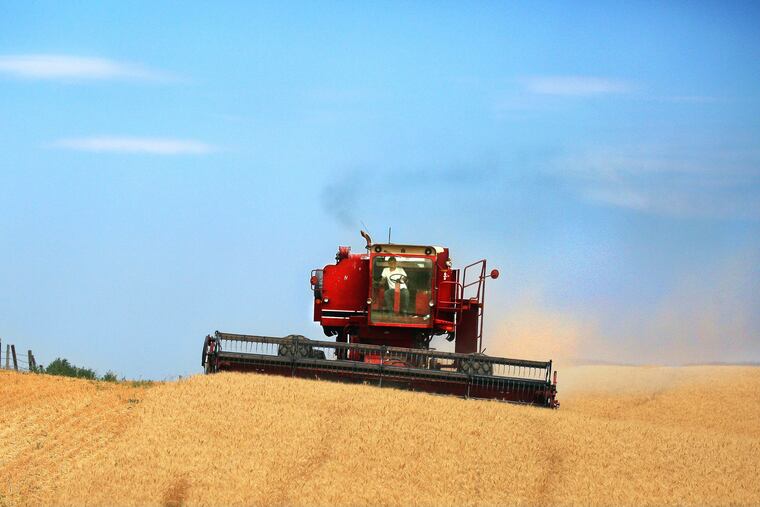Unrelenting Rain Puts U.S. Farmers on Insurance-Deadline Watch
With unceasing rain keeping farmers out of fields, growers are increasingly weighing how best to get paid and ease the impact from the bad weather and an escalating U.S.-China trade war.

(Bloomberg) — Kansas farmer Mark Nelson has until Saturday to plant his corn or lose the insurance that protects him from a drop in prices or yield. Instead, he’s hopping on a plane to visit his father in Chicago.
Nelson is now considering a different type of insurance coverage known as prevented-plant claims, which pay out when farmers are unable to sow crops at all. With unceasing rain keeping farmers out of fields, growers are increasingly weighing how best to get paid and ease the impact from the bad weather and an escalating U.S.-China trade war.
“You hate to farm for insurance, but in a year like this, you keep that in the back of your mind,” Nelson, whose farm is near the east-central town of Paola, said by phone.
Storms across the Midwest and Great Plains have resulted in the wettest 12-month stretch on record in the U.S., with the deluge closing refineries and snarling Mississippi River traffic. Crucially for agriculture markets, it’s also hampered crop planting. Worries over tighter supplies due to the soggy weather drove Chicago corn futures to surge as much as 3.9% on Friday, topping $4 a bushel and rising to the highest level in almost a year.
The wet weather’s showing no signs of easing, and the insurance deadline for sowing has already passed for some farmers in southwestern Missouri, southeastern Kansas and western Tennessee. They now have to decide whether to plant with less coverage, or make prevented-plant claims.
Further complicating matters is President Donald Trump’s announcement on Thursday that farmers could apply for a slice of a $16 billion aid package to mitigate the impact of the U.S.-China trade war. However, in order to qualify, farmers must plant crops. Then, payments will depend on production in the their county.
The Senate also passed a $19.1 billion natural disaster relief package that includes $3 billion related to the loss of crops in recent hurricanes, flooding and for seeds prevented from planting this year. A Republican House member temporarily blocked fast-track passage, meaning lawmakers will probably vote when they return in early June from a week-long recess.
Read Related Coverage
Unending Midwest Rains Add to Wettest 12 Months Ever in U.S.U.S. Farm Aid May Create Distortions It Was Supposed to AvoidU.S. Seeks to Avoid Planting Distortions With New Farm AidTo subscribe to daily grains updates, click GRNSOYUPD, then on the subscription button at the top of any story
Farmers unable to plant have been estimating which government-backed program might pay the most.
Nelson only has 400 acres of corn planted and 1,700 more to go. He loses all insurance protection on corn if not planted by June 14, and if that happens, he’s considering switching some ground to soybeans, which can be planted later without risking a crop loss in an early freeze.
After the deadline, farmers can choose to switch to a second crop. But that’ll reduce the amount they will receive from the prevented-plant claim on the first crop. “I talked with my crop insurance agent to make sure I knew all the scenarios,” Nelson said. “Until June 14, we’ve got the option to still plant and get some coverage.”
Moving On
BMO Capital Markets equity analyst Joel Jackson said the lack of plantings have also weighed on demand for agriculture chemicals and fertilizers. “We’ve seen views projecting at least 5 million corn acres will not be planted,” he said in an emailed report. The U.S. Department of Agriculture in March estimated corn planted acres at 92.8 million.
Iowa corn and soybean farmer Kyle Wendland has planted most of his crops, but was leaning toward making a prevented-plant claim for his final 80 acres of corn due to wet conditions. The government aid payments will not be a big swing factor, he said.
“I’m not going to mud my crop in just to get an unknown payment. I will take the known insurance payment and move on,” Wendland said.
—With assistance from Dominic Carey, Mike Dorning and Shruti Date Singh.
To contact the reporter on this story: Michael Hirtzer in Chicago at mhirtzer@bloomberg.net
To contact the editors responsible for this story: James Attwood at jattwood3@bloomberg.net, Pratish Narayanan, Reg Gale
©2019 Bloomberg L.P.